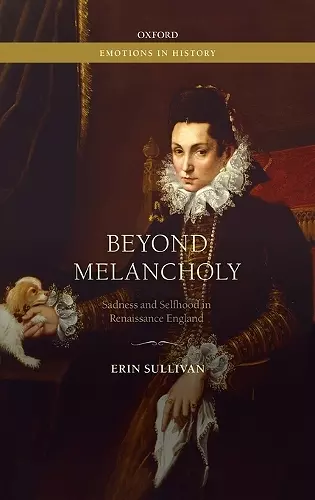Beyond Melancholy
Sadness and Selfhood in Renaissance England
Format:Hardback
Publisher:Oxford University Press
Published:3rd Mar '16
Currently unavailable, and unfortunately no date known when it will be back

From Shakespeare's Hamlet to Burton's Anatomy to Hilliard's miniatures, melancholy has long been associated with the emotional life of Renaissance England. But what other forms of sadness existed alongside, or even beyond, melancholy, and what kinds of selfhood did they help create? Beyond Melancholy explores the vital distinctions Renaissance writers made between grief, godly sorrow, despair, and melancholy, and the unique interactions these emotions were thought to produce in the mind, body, and soul. While most medical and philosophical writings emphasized the physiological and moral dangers of the 'dis-ease' of sadness, warning that in its most extreme form it could damage the body and even cause death, new Protestant teachings about the nature of devotion and salvation suggested that sadness could in fact be a positive, even transformative, experience, helping to humble believers' souls and bring them closer to God. The result of such dramatically conflicting paradigms was a widespread ambiguity about the value of sadness and a need to clarify its significance through active and wilful interpretation - something this book calls 'emotive improvisation'. Drawing on a wide range of Renaissance medical, philosophical, religious, and literary texts - including, but not limited to, moral treatises on the passions, medical text books, mortality records, doctors' case notes, sermons, theological tracts, devotional and elegiac poetry, letters, life-writings, ballads, and stage-plays - Beyond Melancholy explores the emotional codes surrounding the experience of sadness and the way writers responded to and reinterpreted them. In doing so it demonstrates the value of working across source materials too often divided along disciplinary lines, and the special importance of literary texts to the study of the emotional past.
Sullivans sustained examination of the 'more personal and practical manifestations' of sadness are refreshingly sensitive to, and engagingly positive about, the easily obscured felt experience of a historically specific but messy emotion. * Eric Langley, The Seventeenth Century. *
[a] fine first book ... Sullivan's very readable study draws on sources as diverse as moral treatises, mortality records, devotional poetry, letters and ballads. * Karen Shook, Times Higher Education *
brilliant ... Sullivan's masterstroke is to show that the world of letters and of drama unlocks the history of experience, connecting discursive debates about conceptual incommensurabilities to a lived reality in which the meaning of embodied and spiritual feelings were sought. * Rob Boddice, Contributions to the History of Concepts *
an elegant study ... This book is significant for complicating our understanding of sadness to encompass not only the corporeal and medical but also the religious, philosophical and immaterial ... Beyond Melancholy shows the value of literary texts and methods to the history of emotions and to the history of medicine more broadly. * Olivia Weisser, Medical History *
Erin Sullivan's scholarly and consistently engaging contribution to OUP's Emotions in History series, Beyond Melancholy, sets out not only to add nuance, local complexity, and taxonomic specificity to broad period conceptions of sadness, but also to make sadness less depressing, showing how depictions of this temperamental excess may be pervasive but not exclusively negative ... Sullivan has recourse to an impressive array of period texts and sources, often devoting considerable time to detailed, and often suitably graphic, accounts of medical practice and case-records, full of scurvy, flatulence, cramps, and fluids. This study, quite intentionally and to its credit, is as comfortable with medical history as cultural history ... There is a real wealth of material here for future scholars * Eric Langley, The Seventeenth Century *
Erin Sullivan's remarkably wide-ranging new book achieves a level of scholarly balance that would secure the approval of any discerning Renaissance physician. In it, she sifts a large and diverse range of historical sources to offer colour and nuance to many 'emotionologies' (conventions) of sadness, recent and contemporary, and their relationships with differing and dominant conceptions of self, body, mind and soul.
This book has helped me further appreciate the complexity of human emotions and has shown me the relevance of an unfamiliar period of history to my daily clinical practice. * Tom Russ, The British Journal of Psychiatry *
Erin Sullivan's Beyond Melancholy offers ample proof of how much there is still to be gained from an in-depth, meticulously contextualized study of an emotion. Marshalling an impressive array of sources ... Beyond Melancholy offers a powerfully synthesizing approach which is nevertheless careful to respect the multi-faceted, contested and often seemingly contradictory ways in which sadness was experienced, viewed by different interpretative communities, and represented. * Freya Sierhuis, Shakespeare Jahrbuch *
ISBN: 9780198739654
Dimensions: 235mm x 164mm x 20mm
Weight: 514g
242 pages